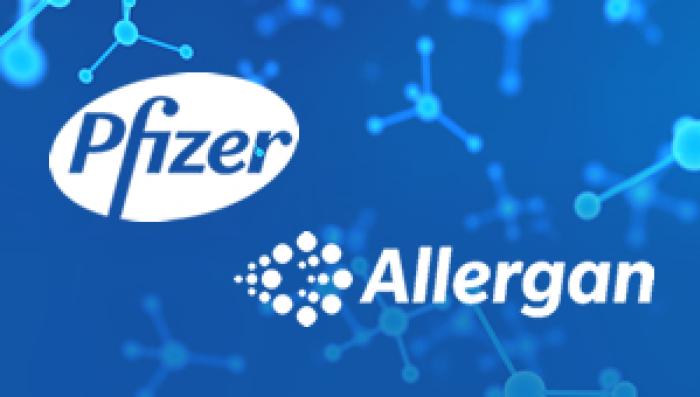In politics, 2015 may be remembered as the year of Trump and Carson, Clinton and Sanders. In the business world, especially in the health care industry, it may be remembered as the year of the merger.
But many politicians aren’t at all happy about the latest such effort: New York-based Pfizer‘s plan, announced Monday, to join forces with Allergan in a mammoth $160 billion deal.
What’s making them queasy: Allergan, headquartered in Dublin, will actually acquire the larger Pfizer, allowing Pfizer – as the combined company will be called – to pay much lower taxes while changing little about how it operates in the United States.
Pfizer’s effective U.S. tax rate is currently about 25 percent. After the merger, it would plummet to about 17 or 18 percent, with the money going to the Republic of Ireland.
One of the largest drugmakers worldwide with household-name products like Viagra and Lipitor, Pfizer tried to implement a similar strategy, known as an inversion, last year by taking over London-based AstraZeneca, but the companies failed to strike a deal.
Pfizer seems unlikely to bow to grumbling lawmakers – and is sure to rev up its lobbying machine as lawmakers and regulators scrutinize the megadeal, which would create the biggest drug producer in the world if successful.
There’s little dispute that Pfizer packs a lot of lobbying muscle. Take its approach to the Affordable Care Act. During 2009, when the debate over passing Obamacare was at a fever pitch, Pfizer spent $25.8 million lobbying Congress and federal agencies like the Department of Health and Human Services, where the plan was partially assembled.
Some of the issues at stake: Whether Medicare should have the power to negotiate drug prices with pharmaceutical companies, and whether the United States should allow the re-importation of (often cheaper) drugs from Canada and Europe. Supporters of the proposals argued that consumers would benefit from them. But Pfizer and other major drugmakers worked to nix both – and succeeded.
Since the height of its lobbying outlays in 2009, Pfizer’s annual spending has hovered between about $9.5 million and $13.4 million. During the first nine months of 2015 alone, the company had 70 lobbyists on its payroll, who focused mostly on issues related to health and taxes. Unsurprisingly, Pfizer dedicated lobbying resources to opposing the Stop Corporate Inversions Act of 2014.
Pfizer joined a chorus of pharmaceutical companies this year in lobbying on the 21st Century Cures Act, which would expedite the Food and Drug Administration’s drug approval process. It also weighed in on the Medicare Access and CHIP Reauthorization Act, known as the “permanent doc fix.” In addition, the company tried to influence separate but related House and Senate bills to overhaul the patent litigation process.
During the third quarter of 2015, spanning July to September, Pfizer reportedspending nearly $2.4 million on lobbying. Among other issues, Pfizer focused on the Trans-Pacific Partnership, which the pharmaceutical industry originally supported but has criticized more recently because it would reduce the amount of time that companies can keep confidential their data on biologic drugs.
As for political contributions, Pfizer’s PAC and employees donated $2.2 million during the 2014 election cycle, 56 percent of which went to Republicans. Recipients included GOP congressional leaders like former House Speaker John Boehner (R-Ohio), former Majority Leader Eric Cantor (R-Va.) and current Majority Leader Kevin McCarthy (R-Calif.).
The top two recipients, however, were both Democrats: Rep. Joseph Crowley ($28,200) of New York and Sen. Cory Booker ($24,550) of New Jersey. While Crowley sits on the tax law-writing Ways and Means Committee in the House, Booker is a member of the Senate Committee on Commerce, Science and Transportation. Both panels make significant decisions affecting pharmaceutical manufacturers.
Pfizer’s PAC and employees also gave $10,500 to the 2014 campaign committee of Rep. Fred Upton (R-Mich.), the Energy and Commerce Committee chairman who introduced the 21st Century Cures Act, and $24,500 to his leadership PAC. Those contributions made Pfizer the seventh-largest donor to Upton’s campaign committee and leadership PAC combined.
Boehner, Cantor and Upton – along with 37 other members of Congress – owned shares in Pfizer in 2014
This election cycle, Sally Susman, who chairs Pfizer’s PAC and directs the company’s public affairs, has become a “Hillblazer,” raising at least $100,000 for former Secretary of State Hillary Clinton’s presidential campaign. Ironically,Clinton has already denounced Pfizer’s plans to merge with Allergan and lower its taxes.





